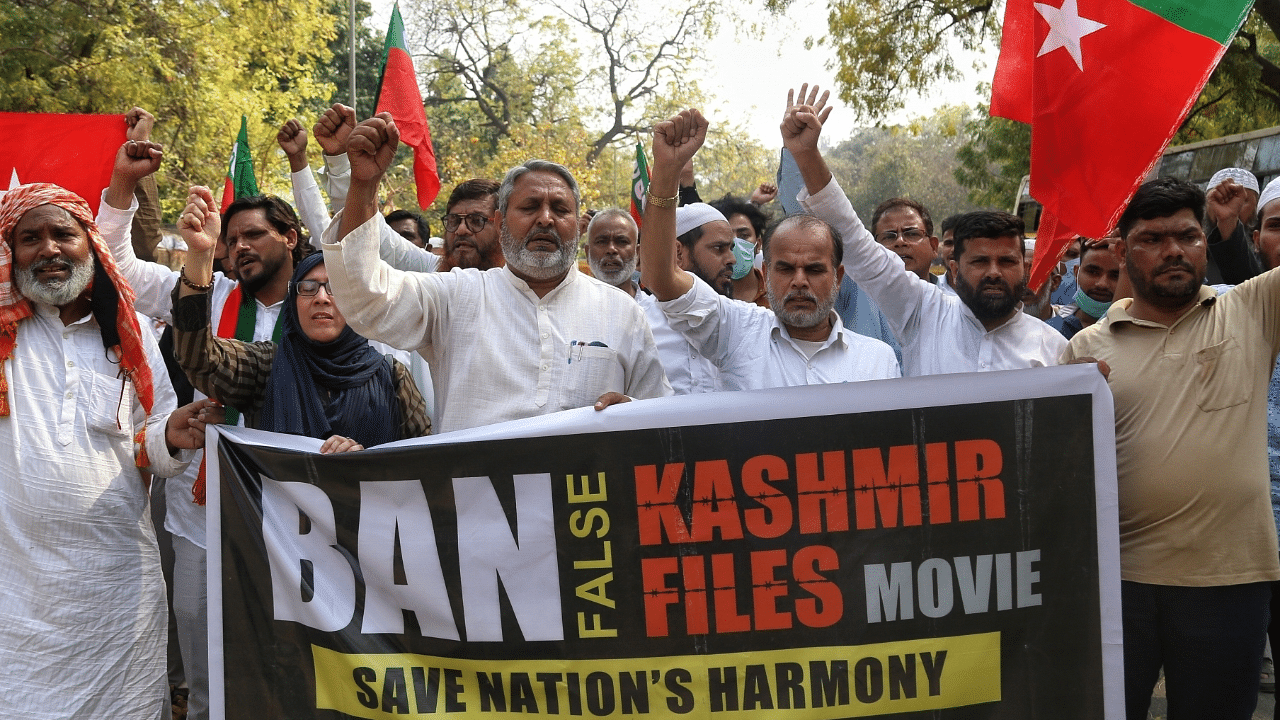
It is no news that the government has heavily endorsed The Kashmir Files. Known, by now, is also the purported plot of the film, which chronicles the ‘genocide’ and exodus of Kashmiri Pandits at the peak of political unrest in the insurgent Valley. At the very outset, it must be said that the film’s basic premise is not ahistorical, for there are innumerable testimonials in the media, in the public domain and in memoirs of Pandits, more than one of which have been in circulation for decades.
There should also be no hesitation in recognising the systemic lack of willingness to acknowledge, even in retrospect, the persecution and precarity that the Pandit diaspora was forced to go through. This is especially the case for liberal and left commentariat; for no one expects counterintuitive understanding from right-wing observers anyway.
Ironically, a film that claims to have corrected this forced amnesia omits some elemental facts itself: how the insurgency actually took shape, the nature of local politics, the brutal role of the Indian state (and police), and how Kashmir was made to walk, almost on a razor’s edge, between federal dependence and cultural autonomy.
Also read: The distorted view of 'The Kashmir Files'
The most obvious lapse of memory is that in 1990, the year in which the film is set, the government at the helm of the union of India was not that of the Congress — the arch-nemesis of the current regime — but V P Singh’s Janata Dal, which was in power with support from the Left and the BJP. And for all their concerns now, the BJP did zilch for the fleeing Pandits then.
For a popular (Bollywood) film this incongruity is not uncommon. The industry has barely concealed its exasperation with facts, research and nuance. We have seen laughable alterations of facts in Mohenjo Daro, Jodha Akbar, Manikarnika or even Padmaavat (the rage against whose imaginary historicity was well-engineered).
There are exemptions to such vulgarisation — Sardar Udham being a prominent and recent one. The Kashmir Files takes liberties with facts, lacks political nous and is tone-deaf about the ethnic complications of Kashmir’s history.
It could still have been left alone as another example of a lurid, popular film that tries to excavate an act of ethnic violence from relative obscurity with characteristic romp and hyperbole, being cavalier about things actual and delicate. Gadar had done it long ago.
But we are in an India different from when Gadar was released. The ready relish with which the rightwing has endorsed and encouraged The Kashmir Files makes it difficult to see it just as an entertainer. The devotees of the
film are calling it an act of correction of a historic wrong, the more dramatic of them even calling it an act of catharsis.
Tax exemption
Several BJP-ruled states have offered tax exemption for the film’s exhibition, an honour once reserved only for films of genuine artistic merit or those validating the values enshrined in the Constitution. Government employees are being offered half-a-day leave to watch the film in the theatres, bolstering its cult.
In keeping with the gross misappropriation of the privilege of tax exemption is the endorsement that has come from the Prime Minister.
There is little doubt that the film is deliberately being used as a work of documentation to drum up hysteria of hate.
It demonises Muslims, who are accused of programmatic Hinduphobia and a murderous jehad against the Pandits. This brazen display of animosity is part of a calibrated and crafty political narrative that would further embolden, if there is still space for it, the entrenched Islamophobia of the country’s rightwing.
In the more immediate future, such overt state-support and sanctions in the form of tax exemption might create a line of identical films. India’s history has numerous lacerations, which resuscitated with a declared aim of vilification or feasting on unhealed or repressed ethnic injuries augers very poorly for us all.
A time-honoured tactic
To that end, the lure of propaganda as a tactic of hate mobilisation will not be immediately lost to those who thrive on it. It is, after all, a time-honoured tactic. The Nazis did it with considerable success in the early years of World War II with films like Suss the Jew, The Rothschilds, The Eternal Jew among several others.
The exercise could be easier in India, because there is a tendency among a very large section of the cinema-going public to consume cinema as a loud lesson, especially in contested spaces of history and politics. However, quiet efforts to make similar inroads into the popular consciousness with caste exploitation, neoliberal slavery or working-class misery usually come with paltry rewards.
In other words, there is something ingrained in historical propaganda that shows all hurt of the past as collective. But contemporary depictions of social exploitation tend to fragment into one of individual suffering. It is here that propaganda gets more complicated than usually understood. And this is precisely why a film like The Kashmir Files or the fact of it masquerading as history, is a case for acute concern.
It is even more obvious when we compare it with a romance like Shikara (2020) — with a similar background and co-written by a Kashmiri Pandit — which sunk into oblivion no sooner than it was released. And this government, which has come out with all guns blazing in support of this film as a historical corrective will likely do everything to stonewall a film made on the Godhra Riots, the Nellie massacre or Babri Masjid demolition which rendered the country’s minorities weaker and poorer. We have seen the chequered public life of Patwardhan’s Ram ke Naam.
To that end, historical correctness is only a matter of perspective from the vantage of whoever is in power.
(Sayandeb Chowdhury teaches at Ambedkar University Delhi)